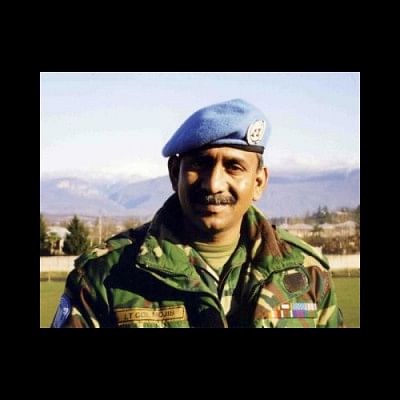Tearful adieu

WE say life moves on and it is only wiser to look forward. But is there anyone who can deny the power of memory? In fact, what we call the present is given shape by an accumulation of the past.
Even unpleasant memories are revisited – sometimes intentionally -- to reimagine if things could have been said or done differently, if we can 'undo' the past. Alas, little do we realise the harsh reality – "Time is like a river. You cannot touch the same water twice because the flow that has passed will never pass again."
A part of us wants to forget these unpleasant memories, while another part of us wishes to preserve them. And it is with these mixed emotions that I remember my brother-in-law Shaheed Col MojibulHoque. Col Mojib was due to retire on April 3, 2009 but the BDR massacre on 25-26 February didn't let him enjoy the leisure of retirement. My wishful thinking over the past six years has been: What if he were still alive? What if he had retired earlier? What if he had fallen ill after the parade on 24 February and wasn't present there that day?
After six long years, I have finally reconciled with his death. Knowing the person he was, I am sure the prevailing situation in the country would have killed him spiritually, anyway. The erosion of values – socially and politically, rising trend of violence, unending greed for power, lack of vision for national interest and the disrespect towards the general public – would have been reasons enough to quash his zeal were he alive today.
We were close friends and shared our views on a wide range of issues. His devotion, patriotism and loyalty were just out of the world! I admired and respected him not only because he was my sister's husband but also as a human being. I remember a very small incident – my sister and I went to a supermarket for picking up groceries and other essentials. Col Mojib accompanied us. As I was about to put a foreign toothpaste in my shopping trolley, he immediately asked why I didn't use Bangladeshi ones, adding, "If we don't patronise our own industries, how will they survive"?
He lived a simple life. His family was his estate. He bought only Bangladeshi sarees for his wife and always preferred Bangladeshi products to give away as gifts. He had a vision for Bangladesh – that someday this country will shine in the world map, the youth will take the lead in shaping the political dynamics for the ultimate good and 'people' will be the biggest asset for this country.
Today, as we somberly observe the sixth anniversary of the Pilkhana massacre, I express my deepest respect to the 74 lives that were senselessly slayed in just 2 days. I am praying for the families they left behind; little do I know how their days are passing.
So, here is the tearful adieu to my ardent wishful thinking that he was still alive I sync my thought with that of Sydney Carton, just before he faced the guillotine in A Tale of Two Cities - "It is a far, far better rest that I go to than I have ever known."
Rest in eternal peace dear Mojib.
The writer is sister-in-law of Col. Mojibul Hoque.

 For all latest news, follow The Daily Star's Google News channel.
For all latest news, follow The Daily Star's Google News channel. 



Comments